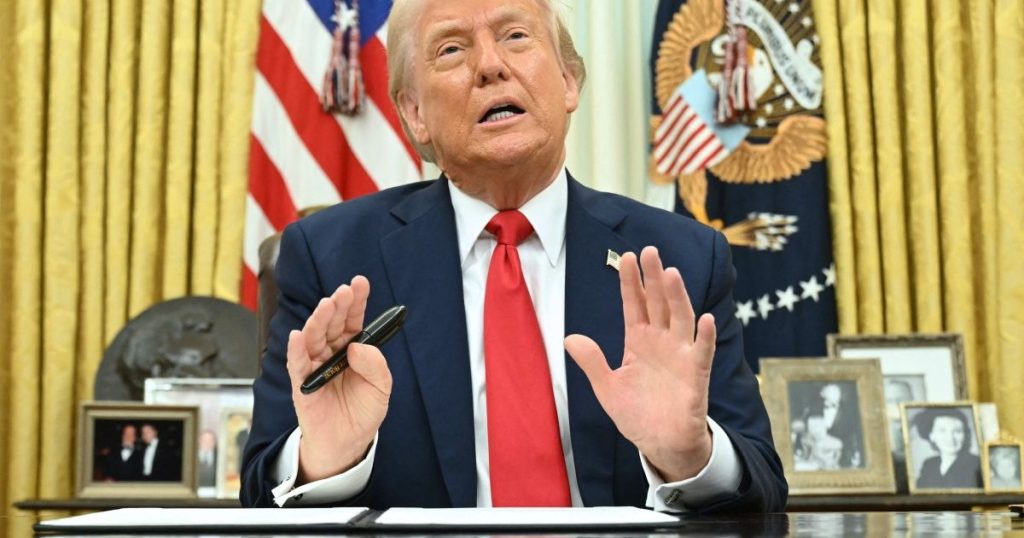Paragraph 1: The Looming Threat of Trump’s Tariffs and the Call for Intra-African Trade
Jeremy Awori, the CEO of Ecobank Transnational Inc., has issued a stark warning to African nations, urging them to bolster trade amongst themselves as a shield against the potentially devastating economic consequences of new tariffs imposed by former US President Donald Trump. These tariffs, Awori cautioned, pose a significant threat to the African Growth and Opportunity Act (AGOA), a trade program that has been instrumental in supporting export-oriented sectors like textiles and apparel in nearly 30 African countries. By strengthening intra-African trade, Awori argues, the continent can lessen its dependence on volatile external markets, particularly the US, and build a more resilient and self-sustaining economic future.
Paragraph 2: The Significance of AGOA and the Potential Impact of Its Erosion
The African Growth and Opportunity Act (AGOA) has played a crucial role in fostering economic growth and development in sub-Saharan Africa. By providing duty-free access to the US market for thousands of products, AGOA has enabled African countries to expand their exports, create jobs, and attract foreign investment. Sectors like textiles, apparel, and agriculture have particularly benefited from AGOA, contributing significantly to poverty reduction and economic diversification in participating countries. However, the Trump administration’s protectionist trade policies and the potential erosion of AGOA represent a significant setback for these gains, highlighting the vulnerability of African economies to external shocks and the urgent need for alternative trade strategies.
Paragraph 3: The Imperative of Intra-African Trade for Economic Resilience and Growth
The call for increased intra-African trade is not merely a reaction to external threats but a strategic imperative for the continent’s long-term economic prosperity. By deepening trade ties within Africa, countries can unlock significant untapped potential, creating larger markets, fostering economies of scale, and promoting regional integration. This can lead to greater diversification of African economies, reducing their reliance on commodity exports and creating new opportunities in manufacturing, services, and technology. Moreover, increased intra-African trade can enhance regional value chains, boost productivity, and create more and better jobs for Africa’s growing population.
Paragraph 4: The Challenges and Opportunities of Boosting Intra-African Trade
While the potential benefits of increased intra-African trade are immense, significant challenges remain. These include inadequate infrastructure, such as roads, railways, and ports, which hinder the efficient movement of goods across borders. Non-tariff barriers, including cumbersome customs procedures and regulatory inconsistencies, also add to the cost and complexity of trade. Addressing these challenges requires concerted efforts by African governments to invest in infrastructure development, harmonize regulations, and streamline border procedures. The African Continental Free Trade Area (AfCFTA) agreement, which aims to create a single continental market for goods and services, represents a major step forward in this regard, offering a framework for reducing trade barriers and promoting regional integration.
Paragraph 5: The Role of Financial Institutions and the Private Sector in Facilitating Intra-African Trade
Financial institutions, such as Ecobank, play a crucial role in facilitating intra-African trade by providing financing, risk management solutions, and cross-border payment systems. They can also support businesses in navigating the complexities of cross-border trade and accessing new markets. The private sector, including small and medium-sized enterprises (SMEs), is the engine of economic growth and job creation, and their active participation is essential for the success of intra-African trade. Governments can create an enabling environment for businesses by implementing policies that promote entrepreneurship, innovation, and access to finance.
Paragraph 6: A Future of Self-Reliance and Sustainable Growth through Enhanced Intra-African Trade
By embracing the vision of increased intra-African trade, African nations can chart a course towards greater economic self-reliance, resilience, and sustainable growth. Reducing dependence on external markets, particularly in the face of rising protectionism, is crucial for ensuring long-term economic stability. The AfCFTA, along with continued investments in infrastructure, regulatory harmonization, and private sector development, can unlock the vast potential of the African market and pave the way for a more prosperous future for all Africans. This shift towards greater intra-continental trade not only mitigates the risks posed by external trade policies but also empowers African nations to take control of their economic destiny and build a more integrated and prosperous continent.














